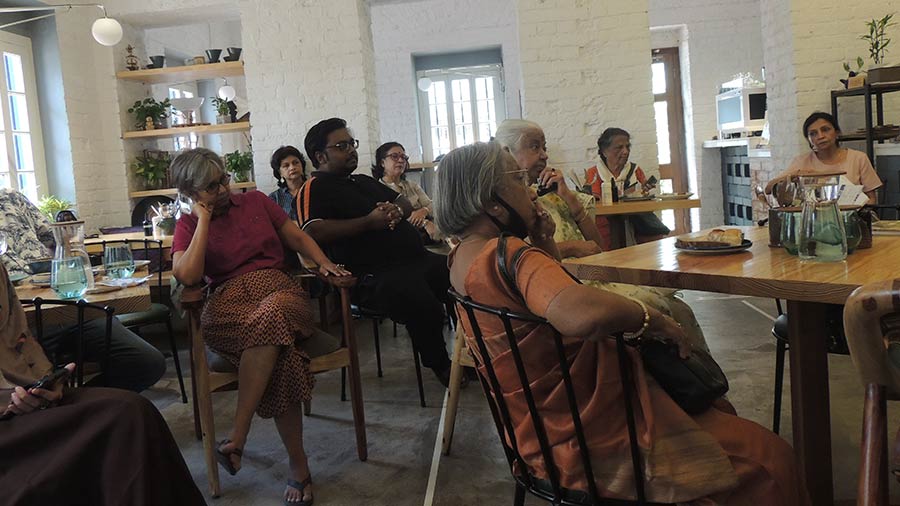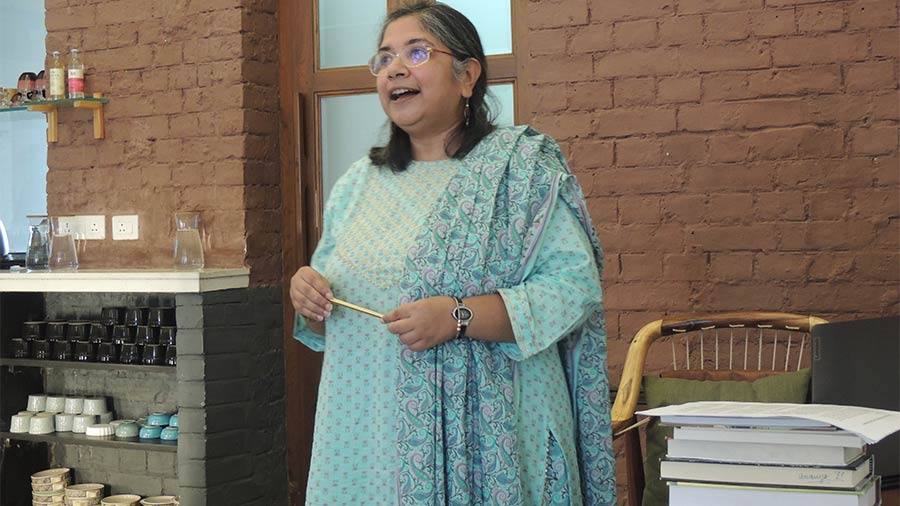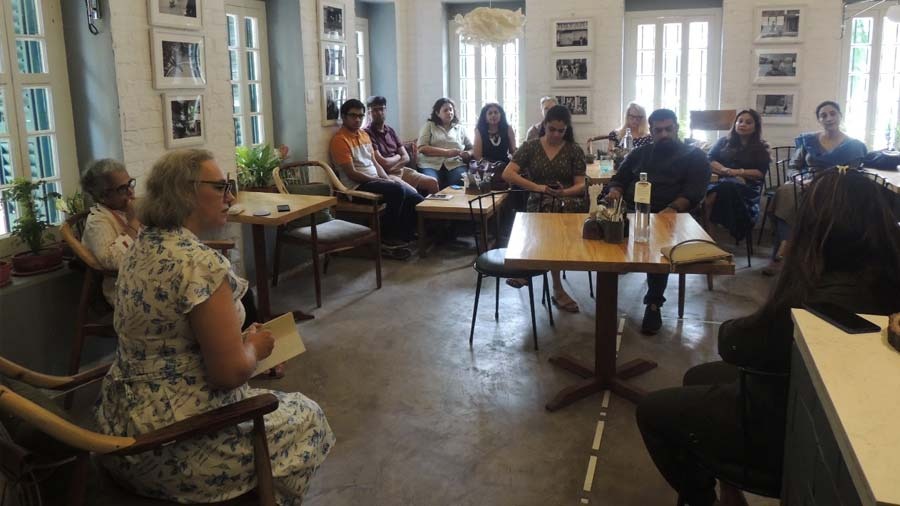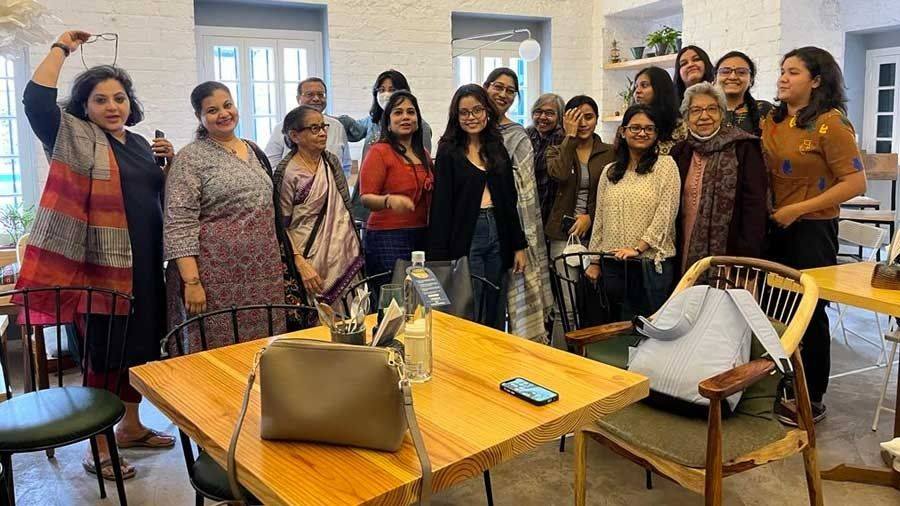Waypoint Cafe on Sarat Bose Road recently played host to an interesting session that discussed why deciphering messages from the avian world could be important in knowing the wonders hidden beneath the mundane.
The rain-swept Sunday morning of June 19 saw Ananya Dutta Gupta reading out and explaining many simple but all-permeating life truths as enshrined in her new book, For Tomorrow the Birds might Still Sing.
The delectable collection comprises “mostly poems, some pictures and a little prose”, informs the book itself but what is not mentioned is how from the heart and ‘painted’ from the soul each of her offerings really are. The conversation was the latest in several interesting talks hosted by the café’s book club, looked after by Saon Sen Nandi and its owner Megha Malhotra.
Alluding to the works of many famous observers and writers, Dutta Gupta emphasised that nature must be listened to. She described how watching common birds around her home in Bolpur, Santiniketan, over the past four years has helped her in framing her thoughts about the environment in times of accelerated climate change.
The teacher of early modern British literature on urban warfare at Visva-Bharati who “writes a lot of essays and poetry in her leisure time” shared that her interest in birds is strictly home-grown and untutored.
Beginning the discussion on her tryst with the avian world on a confessional note, Dutta Gupta spoke of how she had indeed read up some books about birds for this talk but had scrupulously not read about birds per se as she wished this to be an unmediated experience. She wanted to learn from nature instead.
“It’s an interesting transition, one which I have been able to immerse myself in, discussing warfare in the world of birds. It’s a massive paradigm shift which I have been able to arrive at — a kind of urban stuff as compared to when you are being fundamentally opposed to civilisational confrontation and so on. But I take a more naturalistic view on things. There are connections and overlaps as well with what I do academically. That’s how I bridge my two lives,” Dutta Gupta said.
In the contemporary context, there exists, according to the author, a very interesting duality to bird watching and there is also so much that one can read up on birds from the observations of ornithologists across the world. This reality is aided more and more by the advent and democratisation of photography as well as the proliferation of the technological apparatus for engaging with the natural world.
However, her education, Dutta Gupta emphasised, is “tutored mainly from the natural world, and if I may say so, freed from the baggage of authority”.
Describing her experience of compiling the book, Dutta Gupta said: “The problem that arises in many cases is that most writings of famed bird watchers are on many occasions in the form of notes that they inscribe when they want to put down in words things that would otherwise escape their imagination. That is something that I, too, was doing when I was penning down this particular book. My book is thereby a chronicling of regular happenings. There is no scientific academic brilliance and is a gaze where it’s all right to not rely on available knowledge or acquired knowledge.”

The audience at the book club listens with rapt attention. Saurav Roy
Talking about life messages in this exercise, she highlighted historian Dipesh Chakraborty’s writings wherein it is depicted that though people are too preoccupied with globalisation at the moment, they need to be occupied with the planet itself.
Birds, Dutta Gupta pointed out, wereable to mediate between the two spaces that we inhabit — the one being the home and the nest and the other being the outside. Their ability and mobility allow them to soar in the skies and also visit the windows of homes.
Birds — with their wonderful eye for discerning their surroundings, staying alert, conscious to every single twitch around them — are able to straddle the two worlds and that is what makes them interesting chroniclers of the happenings of the world. They are able to point to things that are wrong, being privy to any sort of natural or climactic changes. They are more perceptible to changes and are endowed with natural capabilities to recognise changes long before they actually occur.
"Humans have to cooperate with nature as nature’s selection is always going to outstrip human selection and that will always prevail. Birds defy bookish explorations because birds invite or represent a kind of knowledge system that cannot be defined as conventional education. They demand that we remove ourselves from books and other forms of modernity and compel us to look away from the confines of the four walls of the house. As humans we are encroaching on their world and the fact that the birds are coming up to our balconies also portends a significant deterioration of their habitat," said Dutta Gupta.
“Birds are representatives of the other non-human world whom we have to accept and get used to as we go about our ways of figuring out how to stop climate change. The universe in its totality is in a sort of struggle and as we or other species, birds included, endeavour to survive and expand in numbers – that is where the crux of climatic changes or degradation exists. Birds are, of course, saviours for humans but there exists a symbiosis in this as both need each other to survive. Birds, like any other life form, is driven by a deep-rooted desire for survival and so in every way they are co-survivors in this world of turmoil and calamities and their trade secrets are what we need to know, not from any book but by being with them in their own sphere,” she also said.
"Again, birds can be an amazing cure for human narcissism as they compel us to look away from ourselves. If the human mind can be seen as a home, then birds — even as they impose on our introspective moments — can actually captivate our thoughts with their lively and cheerful mannerisms. This, by itself, can be very therapeutic for people who feel lonely or are suffering from any sort of mental despair. Human perceptions that we think of ourselves as being superior and able to communicate with each other are shattered when we see how birds are able to convey and interact with each other," she observed.
Asked about the possible impact of the imminent rollout of 5G cellular services on the avian population, Dutta Gupta said, “Though I am in no position to comment on this from a technological point of view, I do believe that it will probably depend on what sort of a technological leap the rollout will be vis-a-vis 4G. I do believe that there is a threshold to how much birds can adapt, and I am not exactly sure if they can meet this fresh new challenge. I am actually dreading the imposition and I am also in torment over what it has been doing to human beings. I ask everyone to spend a decent amount of time outside their immediate selves and in the midst of nature in its pristine form. Our gaze has been commandeered away from everything outside to a little screen. It’s a narcotic that is making us even more cavalier about the changes that are happening.”


